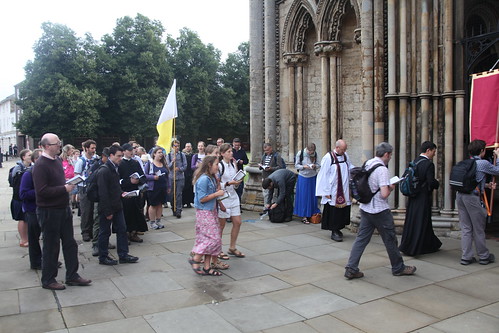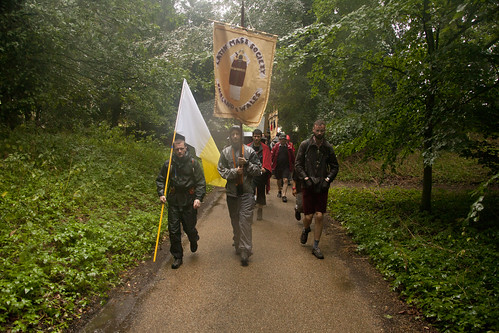 |
| Carrying the Papal flag on the Latin Mass Society Walsingham Pilgrimage |
I am still catching up with Pope Francis' long interview and the various reactions to it. The Sensible Bond has a very interesting analysis. I have a very simple observation to make: whatever we make of the tone or what is left unsaid or all those (very interesting) things, we must hold onto the reality that this is not a prelude to the Holy Father changing any of the teaching of the Church.
He says as much himself. Referring to his remarks on the aeroplane back from Rio about homosexuals, he says that it is completely in line with the Catechism. You look at what he said, the actual words, and he is right, it is. It was taken as indication of a revolutionary change of teaching by the secular liberal press, but it wasn't. It was just one aspect of the Catechism's teaching, which Pope Francis wanted to underline.
Conservative and traditional Catholics have got used to decoding the drivellings of liberals who are conducting a campaign to change the teaching of the Church; I have written often enough about this on this blog. Basil Loftus does it all the time; Elena Curti's article about the ordination of women is a good example as well. Curti never said that the Church should change her teaching and ordain women; she offered various practical, cultural and theological considerations in favour, mostly in the mouths of people she'd spoken to, and she offered not a single line presenting the case for the other side of the debate. It is easy to see what conclusions she wants her readers to draw. Why, we may ask, was she not more open? Because she is writing in a 'Catholic' periodical, and she wants to win the argument without exposing herself to charges of open dissent. Such charges would embarrass the Tablet's Catholic friends, it would make it easier for people to object to its being sold in churches, it would cut it off from the Catholic readership it wants to influence. So there are strict red lines about what you can say openly and what you can only hint at. Even though the hinting can be pretty unmistakable.

Now, when we battle-scarred Trads look at a text like Pope Francis' interview, our finely-tuned antennae are waggling away trying to pick up the coded messages in between the lines. This has become second nature. But the point I want to make here is that we aren't dealing with a Basil Loftus or Elena Curti (or even an Austen Ivereigh, though exactly what he thinks I leave to anther day). We are reading the words of the Supreme Pontiff. This makes a difference not because what he says off the cuff in an interview is infallible (it isn't), but because he has supreme authority in the Church, and if anything can be changed, he can change it. So if, like our typical Catholic dissident, he thought a teaching could be changed, and wanted to change it, he need not fear being branded a heretic for proposing quite openly that it be changed - heck, he could sign a decree and change it forthwith.
The point is that if Pope Francis appears to be beating about the bush and not quite saying what some readers long to hear, but instead dropping hints and what not, he is not doing this for the reasons that Elena Curti does it. She does it because, although she is convinced that the changes would be right and good, she wants to keep within the limits of acceptable dissent to maintain the fiction that she is writing in a Catholic newspaper. If Pope Francis is doing it, he is doing it for the opposite reason - in fact, he is not doing it at all, he is doing something quite different, which just has a superficial resemblance to the dissident stuff. If Pope Francis can't quite bring himself to say that homosexual acts can be morally permissible, it is not because he thinks they are but wants to keep his head down. It is because he knows that this is something which can never be taught. He knows that the immorality of homosexual acts is irreformable teaching.

Curti strains and strains to convey the message that women can and should be ordained, by saying everything which can be said in favour of it without quite coming clean about her own position. Pope Francis' great effort is to do the opposite: to say everything (for want of a better word) positive, nice, about homosexuals (and on the other issues), not to give the impression that the teaching is going to be changed, but precisely because he knows it never will be, and so we have to make the best of it.
I'm not saying that this is necessarily a good strategy. There are dangers of misunderstandings, even of raising false expectations. But it appears to be the Holy Father's strategy. It is, in fact, a familiar one, associated in my mind with the members of an older generation of liberal, now gone to their rewards, who quite sincerely took the basic teachings of the Church so much for granted that they felt free not to talk about them very much, but to accentuate the positive. We find, in fact, that kind thing suggested by Bl Pope John XXIII, in his opening speech to the Second Vatican Council.
 Nowadays however, the Spouse of Christ prefers to make use of the medicine of mercy rather than that of severity. She considers that she meets the needs of the present day by demonstrating the validity of her teaching rather than by condemnations. Not, certainly, that there is a lack of fallacious teaching, opinions, and dangerous concepts to be guarded against an dissipated. But these are so obviously in contrast with the right norm of honesty, and have produced such lethal fruits that by now it would seem that men of themselves are inclined to condemn them, particularly those ways of life which despise God and His law or place excessive confidence in technical progress and a well-being based exclusively on the comforts of life. They are ever more deeply convinced of the paramount dignity of the human person and of his perfection as well as of the duties which that implies.
Nowadays however, the Spouse of Christ prefers to make use of the medicine of mercy rather than that of severity. She considers that she meets the needs of the present day by demonstrating the validity of her teaching rather than by condemnations. Not, certainly, that there is a lack of fallacious teaching, opinions, and dangerous concepts to be guarded against an dissipated. But these are so obviously in contrast with the right norm of honesty, and have produced such lethal fruits that by now it would seem that men of themselves are inclined to condemn them, particularly those ways of life which despise God and His law or place excessive confidence in technical progress and a well-being based exclusively on the comforts of life. They are ever more deeply convinced of the paramount dignity of the human person and of his perfection as well as of the duties which that implies. This might not be the most realistic assessment of the world in 1962, but Pope John was no heretic. I am sure it never crossed his mind that the 'medicine of mercy' might cross over into re-writing the teaching of the Church to leave out the awkward bits.
I am convinced that Pope Francis would die rather than say that marriage is not indissoluble, that homosexual acts are not gravely sinful, or to deny any of the other hard teachings which the Church has received from Jesus Christ. That is not just a figure of speech: I am quite sure that he would suffer martyrdom for these truths, if it came to that. This is something conservatives and liberals alike need to keep in mind.

Well said, imnsho. Thank you
ReplyDeleteGood post!
ReplyDeleteI don't think the main concern in most faithful Catholics is that he will change the teachings of the Church and most will look for any excuse to trust the Pope and his fidelity. Our main concern in his words is that he spends the next two and a half decades (he's young enough) confusing the faithful and dismantling the papacy to the point that it will take hundreds of years to recover. And "[he has] the humility and the ambition [to do it]". The Church will obviously survive, but history has shown that a several hundred year decline is also possible. This prospect has plunged many into a dark night of the senses before we have mastered the dark night of the soul. This sort of reversal is extremely demoralizing.
ReplyDelete"two and a half decades"?
DeleteThat's 25 years! He is currently a little short of 77 (which he turns in December). No, unless he has incredible longevity (even in these days of modern medical science), I doubt that he will live to 100! I'm guessing ten years. That's much more realistic.
Isn't the problem with Francis that he is, like all the post-conciliar Pope's before him, a liberal of the old school, just as Blessed Pius IX was before his rude awakening? Perhaps we ought to ask Blessed Pius IX to intercede for our current Pontiff.
ReplyDelete“it can never be taught”.
ReplyDeleteWe live in interesting times. The latest problem in these troubled these days is that good, orthodox, thinking Catholics are publicly puzzling over, or “catching up” with the meaning of the Pontiff’s words, on the aeroplane, as well as many other public utterances concerning grave sins recently hinted at, such as the remarriage of someone still in a valid existing marriage.
Now this is a new development and can never be a good thing.
However, the Holy Father has now made a significant announcement which goes a long way towards resolving this problem. At a recent conference on Catechetics he stated clearly that the Catechism of the Catholic Church, the teaching of the Magisterium of the Church in effect, is the standard we must observe. It is “the memory of God”.
The issue no doubt is judgment of the sin as opposed to the sinner, for both Catholics and non Catholics. The conscience of Catholics is bound by the teaching of the Magisterium of the Church - as expressed in the CCC. As for non-Catholics, well the duty of all Catholics to teach them that the Catholic Church is the one true Church for the salvation of all mankind and that, therefore, they should accept that and be bound by its judgements. How they do that is of course another matter.
Personally, I think that matters are a lot clearer now.